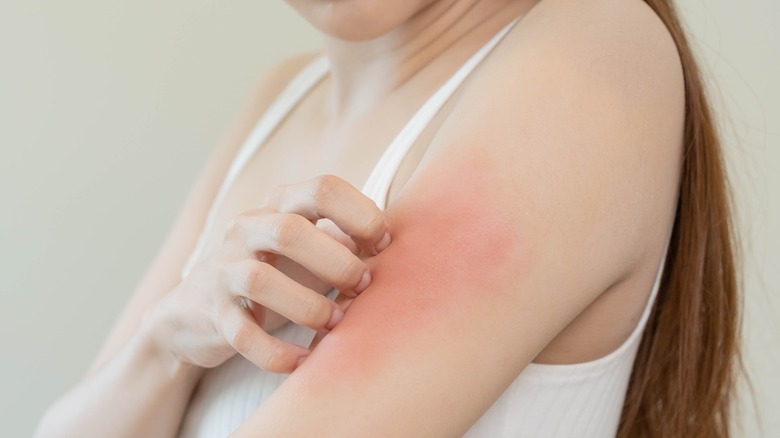Can You Be Allergic To Spray Tans?
Rather than risk direct exposure to the sun's UV rays, some people may instead opt for the gentle misting of a spray tan. However, chemical ingredients found in the makeup of spray tan mist may pose some potential health issues.
For example, DHA — or dihydroxyacetone — is one main ingredient in spray tan mist that darkens the skin's pigmentation, reports the U.S. Food and Drug Administration (FDA). As a color additive, it reacts with the skin's amino acids, producing a bronzed summertime glow. However, for a small number of people, DHA can provoke an allergic reaction. According to the London Allergy & Immunology Centre, roughly two out of every 100,000 individuals are allergic to DHA. Due to a lack of reported safety data, the FDA states they have not formally authorized the use of DHA in commercial spray tans.
But DHA isn't the only spray tan chemical one could develop an allergy to. "You might also find common allergens such as phenoxyethanol, tocopherol, propylene glycol, and cocamidopropyl betaine," Dr. Peterson Pierre, dermatologist and founder of the Pierre Skin Care Institute, told Shape. Such chemicals can all stimulate a condition known as contact dermatitis.
What is contact dermatitis?
Prompted when an allergen comes in direct contact with the skin, board-certified dermatologist Dr. Rebecca Marcus, tells Shape, "[Contact dermatitis] can take the form of itchy bumps or redness and irritation on the skin." Dr. Marcus goes on to describe additional contact dermatitis allergy symptoms that warrant immediate medical care. "It's also possible to have a systemic reaction, which may include eye, tongue, and lip swelling, generalized swelling, urticaria (hives), and trouble breathing," Dr. Marcus tells the publication.
The FDA states that rashes, dizziness, coughing, and fainting have also been reported by consumers in association with spray tanning booths. Yet the agency acknowledges that medical conditions or pre-existing allergies may potentially play a role in these reactions. However, Dr. Marcus cautions that a contact dermatitis allergy can still develop even after long-term use of the same skincare or makeup products, per Shape. "Formulas often change, so it's possible to develop a reaction to a product that [you] previously did not react to," Dr. Marcus tells the publication.


